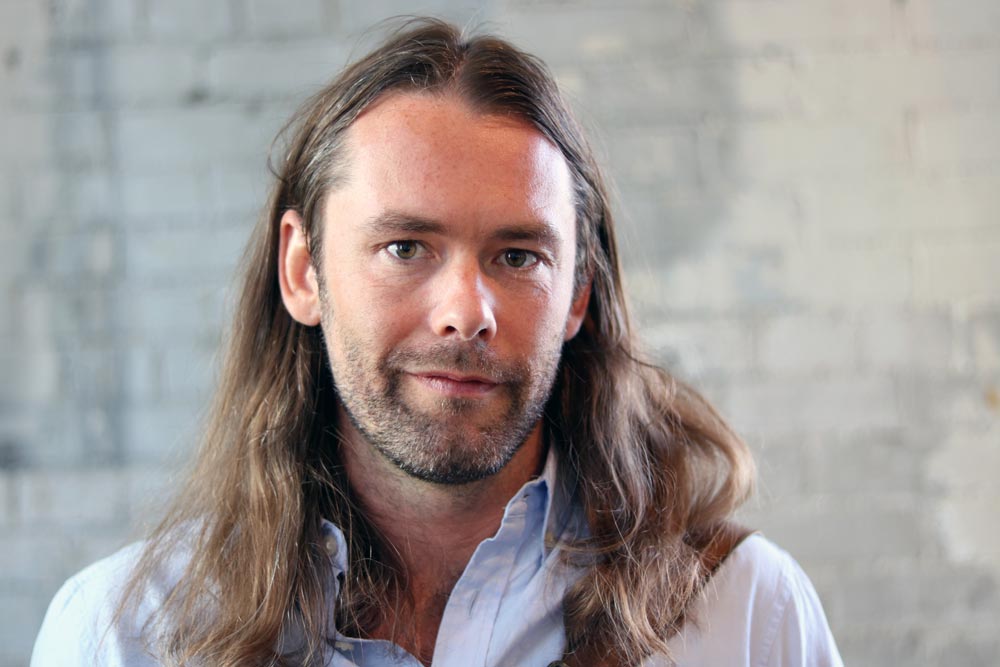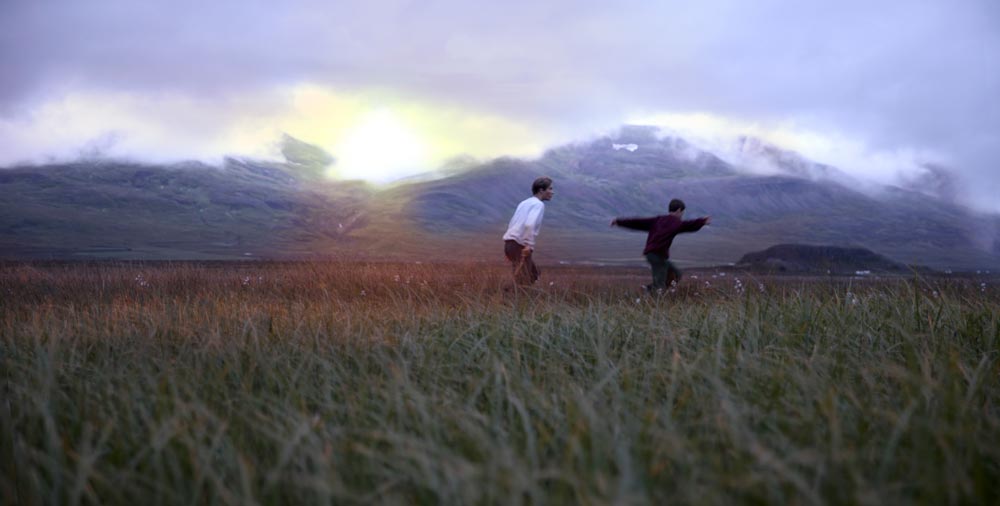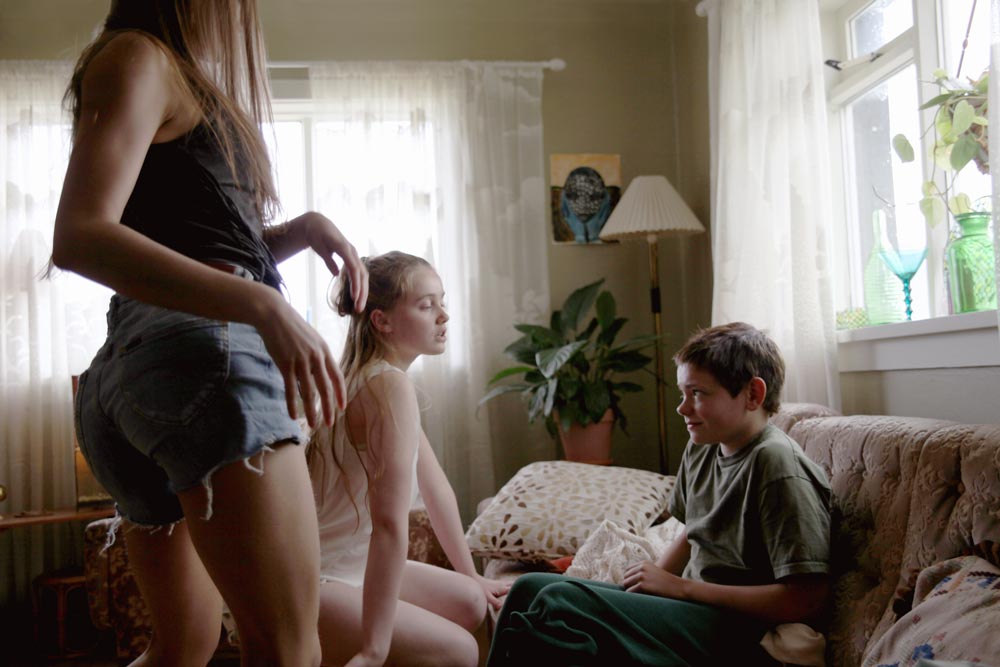
På en tirsdag morgen møder jeg instruktør Gudmundur Gudmundsson. Han er rejst til Toronto I forbindelse med filmfestivalen for at præsentere sin første spillefilm, Heartstone. I den anledning fik jeg lov til at møde ham, og tale vidt og bredt om alt lige fra de personlige rødder i historien til det finurlige valg af Søren Malling som “udlændingen”. Det var en hyggelig lille snak, og jeg håber at få lov til at gøre det igen, når han engang i fremtiden får lavet endnu flere spillefilm.
This is just a basic first question, but why did you decide to tell this particular coming-of-age story?
The characters and the town are inspired by my time partly growing up in a small village in Iceland, but there wasn’t any particular strong reason for this story. I thought it was an interesting period. Then I just started exploring it and kind of fell in love with those characters.
While I was watching this I couldn’t help but feel for Thor and Christian, who are so sensitive, but don’t know how to express themselves. On top of that, and especially in the first half of the film, every person who is supposed to be a caretaker seems to be so selfish and insufficient, particularly Thor’s sisters, who are very mean. I was just wondering if that was intentional?
I had two older sisters and that is basically how our interactions work, but they have a tender side. So growing up my sisters had this teasing, manipulation side to them, but also a tender side as well. I write very subconsciously, so I try not to think too much about, why I’m doing certain things, but I wanted to make sure, that [the characters] have both sides. Obviously, Rakel have a little more issues with herself, but was hoping, and I hope you saw it too, that there is a reason why Rakel is acting the way she does.
That’s right. Your first impression is so extreme, but then you progressively move backwards and find out why.
They used to throw me out all the time, or when we had visitors and I came out of the bathroom, they tried to throw me in the living room and remove my towel. It was almost like a game.
So it is almost autobiographical?
A lot of the scenes are autobiographical, but the gay element is fictional. Even though that is fictional, a lot of the character and intimacy between the boys is still real.

I just saw another Icelandic coming-of-age film, Sparrows, a couple of weeks ago and this movie reminded me a lot of yours. They both have main characters who have to suppress themselves, because nobody around them are taking them for what they are. I was just wondering if you were inspired by that, or if it is an Icelandic style?
No, I wrote this story a long time ago. I am actually friends with Runar [the director of Sparrows], but I wrote my script before he started on Sparrows. I guess we have a similarity in growing up in Iceland, that when we were kids, a man didn’t show his emotions. It has changed a lot and the new generation is completely different, but opening up emotionally was considered very weak. Even though I had a tender mother, who were very affectionate and a father who were very affectionate, I was still influenced by the society. Don’t show your weak side, don’t complain. You needed to toughen up. I think it has changed a lot, especially in Scandinavia, but it still exists in many countries.
It is interesting that you say that, because I have noticed a sort of renaissance in Icelandic film. During the course of the last year, I have also seen Virgin Mountain and RAMS. All of these films have dark undertones and I was wondering if it is because of the country? It is such a beautiful country, but for some reason all of these films have very dark undertones.
I see Heartstone as being the light one, you know? It is very heartfelt compared to those films. I can see the dark undertones are [in the other films], but there is only a little bit in my film. I guess it is a country with a small population, so sticking out is… maybe this isn’t such a good example, but something like going on a date can make you stick out. If you go on a date with a girl, it is a serious decision, because a lot of people are going to know about that. You are aware of your surroundings a lot, because everybody knows each other. Maybe that part forces you not to express yourself as much. Maybe the nature and weather, with all of the darkness in the winter, plays a role also.
I think my film is super funny, in the first half an hour, but I also think we are used to laughing at the sad parts to cope.

There are a lot of scenes consisting of close-ups. These scenes usually revolves around Kristian or Thor, while they are by themselves. And when I saw the film I felt it represented their emotional state, because they are so repressed, that the camera literally has to move up close too, because they aren’t showing their emotions to anybody else. Was that the intention?
For us it was very important to show the film from their perspective and try to be as close to them and make it feel as real as possible. Sturla [Brandth Grøvlen, fotografen] had a lot of freedom to control the visual side of the production. I wanted the relationships to be very subtle, so maybe that is why we had to move in so close.
What is your directorial style and process?
It is completely different with kids and grownups. We had these kids for 10 months, so they could go through an acting course, because none of them had ever acted before. Because of that, I didn’t have to direct them that much, when we finally arrived on set. I only had simple guiding words to say, because if I told them too much, I would only confuse them.
However, I made sure to tell them, that they couldn’t fail while acting. They could only fail if they gave up, but as long as they kept on trying to get it right, they were on the right track.
What are you most proud of seeing, as this is your first feature?
I am most proud of making the film I wanted to do. When you are making your first feature everyone are always telling you what to do, whenever ever you meet an obstacle. “You should shoot like that” or “Don’t spend so much time on that”. There are so many guidelines that you have to decide, which you want to follow or change. I trust how I want to work. So I made sure to make my own mistakes and learn by them, but not create more problems for everyone else.
What do you hope people will take with them, once they have seen the movie?
I really want people to reconnect with their childhood. I hope that they can reconnect and remember that when we were teenagers we had a huge life, which we tend to forget, as we grow older. We often discard those years and say; “We were young, we were stupid”, but in reality, we were dealing with huge things at that point in our lives. I may sound strange, but I want people to respect that part of themselves.
It doesn’t sound strange at all. It is normal for most people to forget who they were, when they were young.
Yeah, and because you discard your youth, you often discard children at that age. It was such a surprise to me, when I started to write, to discover how much had happened in my youth. I didn’t know. I had completely forgotten it.

I just have one final question, even though it is silly. What is Søren Malling doing in the film? Just because I am used to seeing him in Danish films and all of a sudden he is in an Icelandic film, speaking Icelandic.
He is a foreigner in the film.
I know. They keep referring to him as “the foreigner”.
Yes. I worked with Søren before on a short film, and I always wanted to work with him again. I think he is a great actor and he is so easy to work with. He is the most skilled actor I have worked with. That is why I was just happy when he wanted to do it. I just feel in love with the fact that Thor’s mother was sleeping with a foreigner, because when I was a kid that would have been even more humiliating. Especially in a small area, where an outgoing woman immediately is stamped as a “the town whore”. She is seen as a threat to all the other women, because their husbands may want to seek her out. I experience this with my own mother. She wasn’t a town whore, but in our town she was looked down upon, because she was single and attractive. I would hear these stories and had to fight other boys calling her a whore, because she was seeing older men. If he had been a foreigner on top of that, that would have been unbearable. It is a bit childish, but I wanted to show how the small town racism was.
I’m afraid I don’t have any more questions, unless you want to say anything?
I would like to say that this is a Danish film. I don’t know how familiar Danes are with the Danish influence on Icelandic films. I don’t know, if you know that?
I know a lot them are co-produced by Danish companies.
That is right. This film is produced by my company, and SF Studios, in an equal partnership. Lise [Orheim Stender] and Jesper [Morthorst] were full on producers on this film and guiding us. The sound, music and editing were all Danish. Therefore, as you can see there is a lot of Danish influences, but I don’t know if people in Denmark will ever see it as a Danish film. I don’t think so. There are a lot of Danish fingerprints, but it is hidden, because all of the actors are from Iceland.
Finally, I also have to give a shout out to our cinematographer, Sturla [Brandth Grøvlen]. I have never had as close and as good a collaboration with anybody else. Therefore, he deserves a lot of the credit for everything we have done.